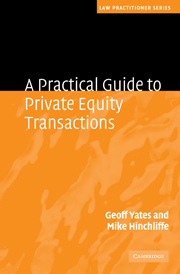Book contents
- Frontmatter
- Contents
- List of figures
- Foreword
- Preface and acknowledgments
- Table of cases
- 1 An introduction to private equity
- 2 The deal process and preliminary matters
- 3 Transaction structures and deal documents
- 4 Acquisition issues
- 5 Equity documentation
- 6 Debt funding
- 7 Employment-related issues
- 8 Pensions
- 9 Tax on private equity transactions
- 10 Public-to-private transactions
- 11 Living with the investment
- 12 Secondary buyouts
- 13 Exits
- Index
2 - The deal process and preliminary matters
Published online by Cambridge University Press: 04 May 2010
- Frontmatter
- Contents
- List of figures
- Foreword
- Preface and acknowledgments
- Table of cases
- 1 An introduction to private equity
- 2 The deal process and preliminary matters
- 3 Transaction structures and deal documents
- 4 Acquisition issues
- 5 Equity documentation
- 6 Debt funding
- 7 Employment-related issues
- 8 Pensions
- 9 Tax on private equity transactions
- 10 Public-to-private transactions
- 11 Living with the investment
- 12 Secondary buyouts
- 13 Exits
- Index
Summary
Introduction
In this chapter, we will look in more detail at the deal process and certain preliminary matters encountered in a typical private equity deal. This will set the scene for the more detailed analysis of deal structures in chapter 3, and the discussion of the key transaction areas and documentation that follow in the later chapters of this book. We also look at the advisers retained by the parties in a deal, and some of the commercial issues and tensions that can arise in respect of their terms of engagement. Market practice has developed over time in this area, and professional and trade bodies have played a role in resolving some of these aspects – enabling the parties and their advisers to align themselves with less friction and delay to the process.
This chapter also considers the early stages in the relationship between the potential sellers and the potential buyers – what risks each faces as a result of the deal process, and the protections they may seek to mitigate these risks. Heads of agreement are used to structure the deal itself (to some extent) and also to set the expectations of the parties in relation to the deal process, giving the parties the confidence to commit the time and expense needed to reach a final, binding contract. In the period leading to the summer of 2007, auction processes became ever more favourable to sellers, having a significant impact on deal processes as sellers looked to exploit the competitive tension that could be created between competing bidders.
- Type
- Chapter
- Information
- A Practical Guide to Private Equity Transactions , pp. 22 - 46Publisher: Cambridge University PressPrint publication year: 2010



